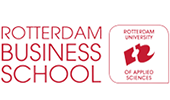Rotterdam Business School (RBS) is the international business school of Rotterdam University of Applied Sciences. International business is what it is all about at Rotterdam Business School (RBS). Over 2,500 students are currently enrolled in their English-taught bachelor and master programmes.
Education, business placements, exchange programmes and practical research projects; they are all aimed at preparing the students for a career in international business. Real-life business cases provided by international companies are at the heart of many courses. They challenge RBS students to learn to act quickly and decisively, and to base their decisions on growing experience and healthy reflection.
Just like in the world of business, RBS focus is fully international. Over 50 nationalities are represented amongst their student population. They work closely with partners in the business and education communities in Europe, Asia, Africa and the Americas to offer their students the global outlook and experience they need to succeed.
Education at Rotterdam Business School follows the Rotterdam Education Model (REM), a mixture of knowledge accumulation, practical experience and personal development. All bachelors’ programmes include periods of practical work experience and study or placement abroad. Masters’ programmes also incorporate a period of practical training. This allows students to gain both experience in their field and a taste of international business even before they graduate.
The international teaching staff at Rotterdam Business School have years of experience in the business world. Many lecturers have held positions in (international) companies in the Netherlands or abroad. Many still work as practitioners or consultant in their various fields. Their experience translates into relevant professional knowledge for and real-life case studies for their students.
ACCOMMODATION
Rotterdam is truly a world city. Home to the largest port in Europe, Rotterdam has global trade and transport links. The city’s history of international trade has helped to shape what is now seen as the typical ‘roll up your sleeves and get cracking’ Rotterdam mentality. Known as the Netherlands’ ultimate festival city, Rotterdam buzzes with activity all year round. Cultural, sporting, and music events are plentiful, while the diversity of cultures means that the cuisine is truly global, too.
Over the years, Rotterdam has grown into a metropolitan city with over 100 nationalities. The city was almost completely ruined during the Second World War. Thanks to a proactive rebuilding plan by the government, Rotterdam was rebuilt into an modern architectural haven, with a few medieval hotspots like Delfshaven, which were left unscathed by German bombs in WWII.
Student housing in Rotterdam usually implies that certain amenities are shared with a others. These amenities include sharing of a kitchen, bathroom and shower. In almost all cases, you will have a fully furnished private room to yourself. Fully furnished usually implies a bed, closet and a desk.
Experience teaches RBS that the longer students study or stay in Rotterdam, the easier and cheaper it becomes to find a room. Their advice is to start your search early. If you still do not manage to find a room before your arrival, you can always stay at a hostel in Rotterdam until you find a room (e.g. Stayok Rotterdam).
- Rotterdam University of Applied Sciences offers international students the opportunity to stay in one of three buildings. Hatta, Erasmus International House and Robert Baeldestraat. Rental prices range from EUR 420 to EUR 560 per month depending on the type and size of the room. These rooms are offered by Rotterdam University of Applied Sciences through SSH, the largest provider of student accommodations in the Netherlands.
- You will find an endless range of rooms and apartments owned by an infinite number of private individuals on the private market.
LIVING EXPENSES
To cover your living expenses, such as housing, food, insurance and transportation you should expect to spend approximately € 700 – € 1,000 a month, excluding your tuition fee.
The costs (per month) are roughly as follows:
- Accommodation € 300 – € 600
- Food € 150
- Going out/sports € 100
- Telephone € 30
- Insurance € 80 – € 100
- Public transportation € 40 – € 100
